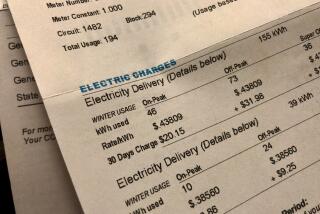Take Precautions With Lure of Easy Credit
- Share via
Question: Enclosed is an ad that appeared in the Los Angeles Times on Jan. 14. This adviser lectures (at $10 a head) on how to obtain numerous credit cards, revealing that “a man in California is listed in the Guinness Book of World Records as having 1,159 valid credit cards, all different. He has $1.25 million in unsecured signature-only lines of credit on cards.”
He reveals how others can raise $50,000 and more just on their signature, using numerous credit cards. Is this legal? I thought there’s a limit on how much one can borrow on one type of credit card no matter how many of them you hold.--B.S.
Answer: Of all the dubious achievements that one might like to see included in the Guinness Book of World Records, why on Earth would he want to have his personal finances aired so publicly?
Yes, when I read the advertisement, I knew I would hear from some of you. You were right on schedule.
No, there’s no legal limit on how much “one can borrow on one type of credit card.” That’s strictly an arbitrary limit imposed by individual credit grantors.
Here are a couple of other thought-provoking excerpts from the ad: “Now, as never before, those who qualify can arrange large lines of credit or cash advances. If you have 5 cards, would you like 50 cards?” Or, “If you could raise $50,000 cash in one hour on your signature alone, could you: make stock market profits? bid at foreclosure auctions? buy real estate? make a business deal? raise money for any purpose!”
Disregarding for a minute why anyone with a brain in his head would want 50 credit cards, what’s the reality of this sort of pitch?
“What a lot of consumers don’t understand,” according to Dehlia Fernandez, consumer-information specialist for TRW Information Services, “is that a lot of credit grantors use your potential for putting yourself into debt as one of the criteria for deciding whether to extend credit to you. What any credit grantor--like Visa or MasterCard--looks for is someone who is steady and who is going to pay him back. Now, every time someone applies for a credit card, it shows up as an inquiry on his TRW record. And, of course, every time you get a credit card it continues to show up on your record whether there’s any balance due on it or not. So, what’s a credit grantor going to think when he sees that you’ve either applied for, or have gotten, 30 or 40 other cards? He’s going to wonder, ‘Why?’ ”
The key phrases that keep popping up are “on your signature alone” and “without collateral” because these are exactly the thoughts foremost in the mind of anyone deciding whether he should issue you a credit card.
Will He Pay Me
“That’s what any credit grantor is going to zero in on,” according to Larry Williams, senior public relations officer in San Francisco for the Bank of America. “He’s going to ask himself: ‘If I give him a $5,000 line of credit, would he actually be able to pay me back if he goes out and borrows $5,000 from each of these others, too?”
And, Williams points out, every time you make application for a credit card and sign it, “you’re swearing that all of the information is correct, and included in the information required is all of the credit cards that you currently hold and how much you owe on them. Then he’s going to ask himself if the applicant’s income matches up with all of borrowing capacity available to him.”
You’ve got an income of $25,000, for instance, but you hold credit cards with a borrowing capacity of $200,000. The credit grantor can be excused for again asking, “Why?”
“The only thing about this that makes sense to me,” Williams adds, “is that he’s encouraging people to go out, fill out and immediately mail in as many credit card applications as possible. This would open up a window when his credit is being checked--maybe by 50 credit grantors--at the same time, but, since he hasn’t actually received any of them yet, the actual possession of them wouldn’t show up on his record.”
But, as debt counselors all over the state can attest: The woods around here are full of people who can’t handle a single credit card without getting into deep, deep trouble.
You want to spend $10 for advice on how to get 50 of them?
Good grief! Why?
Q: I think that the Public Utility Commission is doing a fraudulent thing in suggesting that there is anything impartial in its “investigation” of disputes raised by consumers about the utilities over which the PUC is supposed to be the watchdog.
Early last year, I disputed about 80 or 90 telephone calls wrongly billed to me by Pacific Bell. After my complaints to Pacific Bell came to nothing, I followed the procedure outlined on the back of my telephone bill: I wrote a check to the PUC for the amount being disputed and gave them a letter outlining my problem with Pacific Bell. I told the PUC not to forward my check to Pacific Bell. And there the whole thing sat from the time of the dispute in March until late October when my bank returned to me my check, which had not been cashed by either the PUC or Pacific Bell. But at no time was I ever contacted by either the PUC or Pacific Bell.
I think that in about 99% of the cases, the PUC simply contacts the utility in dispute, waits a little while, and then sends the check on to the utility without any real investigation being done. It seems to me that these disputes should be investigated by someone on the outside .--A.C.
A: That’s the procedure, all right, in those instances where the consumer disputes a phone bill: The utility investigates, and the results of that investigation still leave the consumer unhappy. The consumer sends the PUC a check for the disputed amount, which it deposits in a state account and which automatically prevents the utility--in this case Pacific Bell--from shutting off service until the dispute has been resolved. This then triggers a complete investigation by the utility of the entire dispute.
And this, according to Pacific Bell spokesman Larry Mobb, includes tracing every disputed call to its source. “And, a good part of the time,” he adds, “this resolves the whole thing by reminding the consumer that, sure enough, he did call Uncle Charlie.
“Sometimes,” Mobb continues, “we even call the disputed number ourselves, to see if the other party recalls receiving a call from the consumer on the date in question. And, of course, we physically check out the billing equipment and, if necessary, the actual lines going into the consumer’s house.”
The results of all this are reported back to the PUC, and, if the evidence supports the consumer’s claim, then a check is written to him by the PUC in the amount of the dispute, and Pacific Bell is ordered to write it off. If it decides in Pacific Bell’s favor, then the check goes to the utility.
I think that it goes without saying that neither the PUC nor Pacific Bell recalls your specific complaint the same way you do.
Pacific Bell Dispute
In fact, according to Pacific Bell’s Mobb, the dispute goes back to December, 1984, when you requested copies of all bills beginning in July, 1983, and going back through September, 1984. Going back, essentially, a year and three months took a bit of time, but Pacific Bell got the bundle off to you on Jan. 9, 1985. You disputed all of them, however, and so a detailed breakdown matching names and telephone numbers was mailed to you on Jan. 13, which you also disputed. On March 6 of last year, a check was made of all equipment involved. And on April 2 Pacific Bell told you that, in its opinion, an adjustment wasn’t warranted. That’s when you protested and sent your check to the PUC.
After an investigation of everything that had gone before, the PUC’s records indicate that on May 16 it closed the case in Pacific Bell’s favor, notified you of this disposition and is baffled by your assertion that you heard nothing from anyone until “late October” when the bank returned your uncashed check to you.
Since you had written across the face of the check that you sent to the PUC “Do Not Give to Utility Co.,” the PUC honored this and didn’t even deposit it to its own state account--as it would have done under normal circumstances. Presumably,it simply returned the check to you .
And there we are at full cycle.
Theoretically, I suppose that I would have to agree with you that in these billing disputes between a consumer and a utility, it might be better to have the entire investigation done by some disinterested third party.
From a practical standpoint, however, I’m a little baffled as to how this could be handled. All of the elements in such a dispute are highly technical, involving billing records, automated in-house electronic equipment and telephone lines--access to which, not unnaturally, any utility would be loathe to give to outsiders.
Don G. Campbell cannot answer mail personally but will respond in this column to consumer questions of general interest. Write to Consumer VIEWS, You section, The Times, Times Mirror Square, Los Angeles 90053.
More to Read
Inside the business of entertainment
The Wide Shot brings you news, analysis and insights on everything from streaming wars to production — and what it all means for the future.
You may occasionally receive promotional content from the Los Angeles Times.










